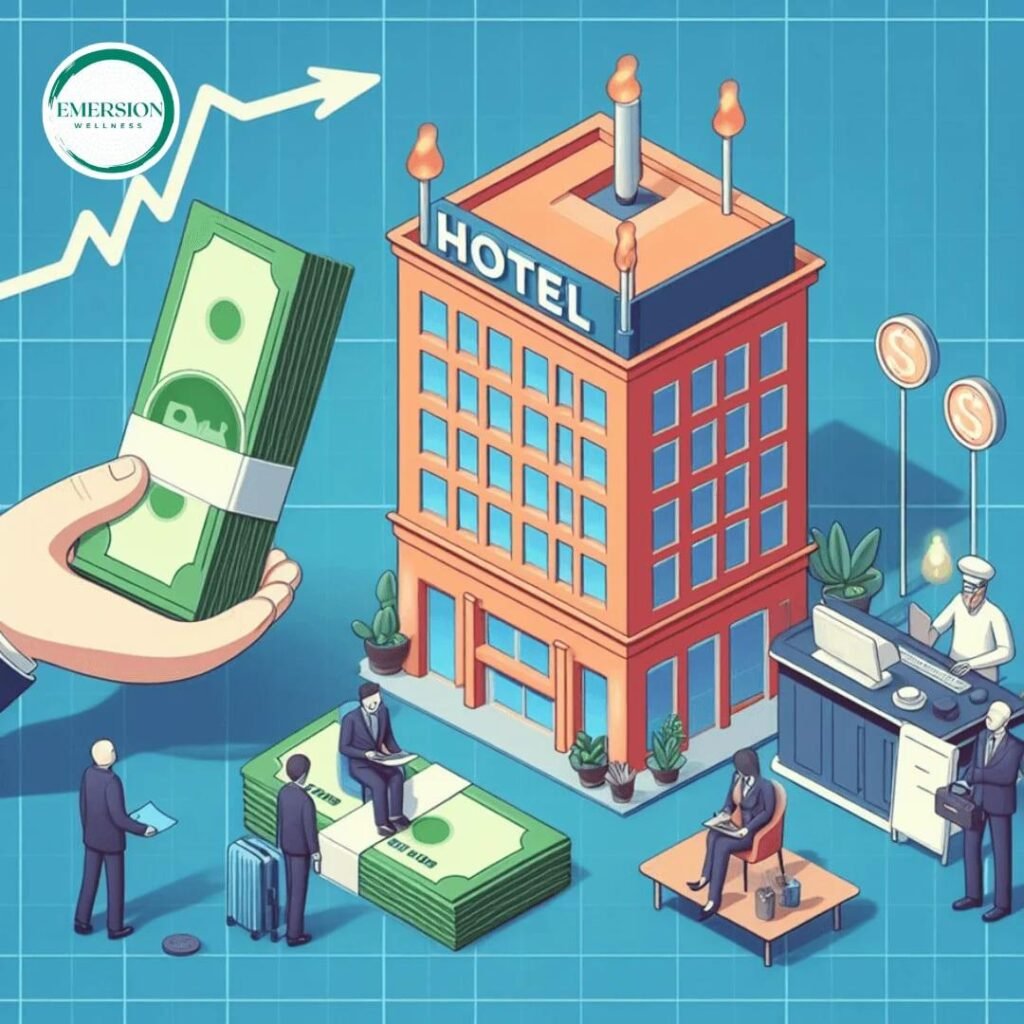In the hotel industry, hotel profit margin represent the percentage of revenue a hotel retains after covering all operating expenses. This percentage shows how efficiently a hotel operates and how much profit it generates. For hotel owners and managers, monitoring profit margins helps identify areas that need improvement. To calculate profit margins, you must consider the following components:
Key Components of Hotel Profit Margins
- Total Revenue: This encompasses all income streams, such as room bookings, food and beverage services, and event hosting. Hotels also generate revenue from other sources like spa services, parking fees, and gift shops.
- Operating Expenses: These are the costs required to run the hotel. Common operating expenses include staff salaries, utilities, maintenance, marketing, property taxes, insurance, and various overhead costs. Managing these expenses efficiently is critical for improving profit margins.
- Gross Profit: To calculate gross profit, subtract operating expenses from total revenue. Gross profit represents the profit generated before taxes and interest. This is a crucial measure of a hotel’s operational performance.
- Net Profit: Net profit is the final amount of profit after subtracting all expenses, including taxes and interest, from gross profit. This figure is often called the “bottom line,” and it reflects how much money the hotel retains.
Calculating Hotel Profit Margins
Expressing profit margins as percentages provides an easy way to assess profitability. The two most common types of profit margins are:
- Gross Profit Margin: This shows the profitability of a hotel’s core operations, before taxes and interest. The formula is:Gross Profit Margin = (Gross Profit / Total Revenue) x 100
- Net Profit Margin: This takes into account all expenses, including taxes and interest, and measures overall profitability. The formula is:Net Profit Margin = (Net Profit / Total Revenue) x 100
Profit margins vary based on several factors, including a hotel’s location, market demand, occupancy rates, and pricing strategy. A higher profit margin generally indicates better financial health and efficiency, while a lower margin suggests room for improvement in cost management or revenue generation.
Factors Influencing Hotel Profit Margins
Several factors affect a hotel’s profit margins, including:
- Location: Hotels in prime locations often command higher room rates, which boosts revenue.
- Market Demand: During peak seasons or in high-demand areas, hotels can charge more, leading to higher profit margins.
- Competition: Intense competition can drive down room rates and reduce profit margins. Hotels must find ways to differentiate themselves.
- Seasonality: Many hotels experience fluctuations in demand based on the time of year. Adapting your pricing and services during low-demand periods is crucial to maintaining profit margins.
Calculating and Interpreting Profit Margins
Calculating profit margins involves more than just subtracting expenses from revenue. It requires a deep understanding of hotel operations and financial metrics. By carefully calculating gross and net profit margins, you can assess your hotel’s financial performance. This analysis helps identify areas for improvement, such as adjusting pricing, managing costs, or improving occupancy rates.
Leveraging Seasonal Trends
The hotel industry follows distinct seasonal patterns. Peak seasons offer high demand, while off-seasons often see a drop in occupancy. Understanding these trends and adjusting your pricing and services accordingly is essential for optimizing profit margins.
For example, during peak season, hotels can charge higher rates due to increased demand. In the off-season, offering special promotions or discounts can help maintain steady revenue and occupancy levels.
Embracing Wellness Trends
One emerging trend in the hotel industry is Emersion Wellness, which focuses on offering holistic wellness experiences to guests. Wellness tourism is growing, and hotels that incorporate wellness practices can attract a new segment of guests. By offering wellness amenities such as yoga classes, meditation sessions, or organic dining options, hotels can increase their revenue and enhance guest satisfaction.
Optimizing Room Revenue
Room revenue is the most significant contributor to a hotel’s income. To maximize profit margins, hotel managers must focus on occupancy rates and pricing strategies. Revenue management plays a critical role in this process, balancing room rates with demand.
Effective Pricing and Revenue Management
Optimizing room rates is both an art and a science. By analyzing market trends, competitor pricing, and demand forecasts, hotels can adjust their prices accordingly. Dynamic pricing, where room rates fluctuate based on demand, is a powerful tool for maximizing revenue.
Revenue management also involves optimizing room availability, ensuring that no room goes unsold during high-demand periods. Hotels can implement advanced software to monitor demand patterns and adjust pricing in real-time.
Leveraging Online Booking Platforms
The rise of online booking platforms has transformed the way guests find and book accommodations. Hotels can increase their visibility and attract more guests by listing their rooms on popular platforms. Effective use of online travel agencies (OTAs), such as Booking.com or Expedia, helps hotels reach a broader audience and improve their occupancy rates.
The Role of Guest Reviews
Online reviews significantly impact a hotel’s reputation. Positive reviews boost bookings, while negative reviews can deter potential guests. Managing guest reviews, responding to feedback, and addressing concerns promptly can enhance your hotel’s reputation and lead to more bookings.
Enhancing Guest Experience with Wellness Offerings
Guest satisfaction is essential for any hotel’s success. Offering wellness-focused amenities and services, such as spa treatments, fitness classes, or organic meals, can elevate the guest experience and foster loyalty. Emersion Wellness provides a unique opportunity for hotels to stand out and attract health-conscious travelers.
Diversifying Revenue Streams
Relying solely on room bookings limits profit potential. Hotels should explore alternative revenue streams, such as:
- Event Hosting: Offering meeting spaces and conference facilities can attract business travelers and corporate events.
- Food and Beverage: A high-quality restaurant or bar can attract local patrons and increase revenue.
- Spa and Wellness Services: Expanding your offerings to include spa treatments and wellness programs can tap into the growing wellness tourism market.
Forming Strategic Partnerships
Collaborating with local businesses and tourism operators can help hotels tap into new revenue streams. For example, partnering with a nearby tour company to offer packages that include hotel stays and local attractions can attract more guests.
Sustainability and Cost Management
Implementing sustainable practices can benefit both the environment and your profit margins. Reducing energy consumption, minimizing waste, and using eco-friendly products can cut costs. Moreover, sustainability attracts eco-conscious travelers who prefer staying at environmentally responsible hotels.
The Role of Technology in Cost Optimization
Technology can significantly reduce operational costs in hotels. Energy-efficient systems, such as smart thermostats and LED lighting, help save on utilities. Additionally, automation tools can streamline booking processes, staff scheduling, and inventory management, leading to increased efficiency.
Embracing Wellness on a Budget
Implementing wellness amenities doesn’t have to be expensive. Simple offerings, like free yoga mats in rooms or healthy snack options, can improve the guest experience without breaking the bank. Gradually incorporating wellness services, like fitness classes or mindfulness sessions, can help you maximize return on investment.
Marketing and Promotion Strategies
Effective marketing is key to attracting guests and increasing revenue. Leveraging digital marketing, search engine optimization (SEO), and social media platforms can boost your hotel’s online presence and drive bookings.
Online Reputation Management
A hotel’s online reputation plays a pivotal role in attracting new guests. Managing your online reviews effectively and responding to guest feedback can enhance your reputation, leading to more bookings.
Harnessing Social Media
Social media is a powerful tool for engaging with potential guests. Regularly posting engaging content, showcasing your hotel’s unique offerings, and interacting with followers can help build brand awareness and loyalty.
Marketing Wellness Offerings
Highlighting your hotel’s wellness services in your marketing campaigns can set you apart from competitors. Creative marketing strategies, such as offering wellness retreats or special packages, can attract health-conscious travelers.
In conclusion, maximizing hotel profit margins involves a combination of effective cost management, smart revenue strategies, and adapting to industry trends. By implementing these expert strategies, hotel owners and managers can significantly increase their revenue and improve their bottom line.






More Stories
Elevate Your Bathroom with Brass Bathroom Accessories
A Comprehensive Guide to Gate Installation
Choosing Quality Aluminum Windows for Homes